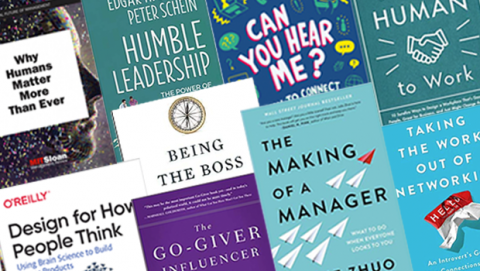What separates successful IT and business leaders from the rest of the pack? Ask this question to a room of CIOs and you will hear the answer in unison: People skills.
People skills, sometimes called soft skills, are not a "nice to have." As Kelly Doyle, managing director at Heller Search Associates, recently told us, “Soft skills are equally important – if not more important – than technical skills. They’re critical to becoming a great leader.”
[ Read also: Soft skills: 5 ways to tell if yours need work. ]
Make no mistake, building people skills – around listening, empathy, and navigating conflict, for example – requires hard work and continuous learning. To that end, we've rounded up some books to give you fresh thinking on how to improve yours:
1. Can You Hear Me?: How to Connect with People in a Virtual World
By: Nick Morgan
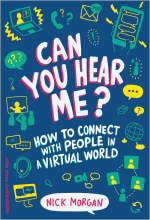
Book description (via HBR): “Communicating virtually is cool, useful, and ubiquitous. But whenever there’s a glitch with the technology or a message is unclear, we’re reminded that the quality of human connection we experience in many forms of virtual communication is awful. We’ve all felt disconnected and bored in a video conference, frustrated that we’re not getting through on the phone, or upset when our email is badly misinterpreted. The truth is, virtual communication breeds misunderstanding because it deprives us of the emotional knowledge that helps us understand context. How can we fix this? In this powerful, practical book, communication expert Nick Morgan outlines five big problems with communication in the virtual world… and he provides a clear path forward for helping us connect better with others.”
Why you should read it: The vast majority of an IT leader’s interactions with others are digital, and – as long-time communication theorist and coach Dr. Nick Morgan points out – ripe for misunderstanding. Morgan reveals what is often lost in virtual communication: feedback, empathy, control, emotion, connection, and commitment. More importantly, in this communications manual for the digital age, he offers advice on how to provide those cues in digital form.
2. Taking the Work Out of Networking: An Introvert’s Guide to Making Connections That Count
By: Karen Wickre
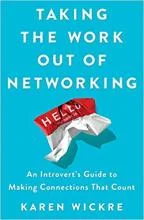
Book description (via Amazon): “Networking has garnered a reputation as a sort of necessary evil in the modern business world. Some do relish the opportunity to boldly work the room, introduce themselves to strangers, and find common career ground—but for many others, the experience is often awkward, or even terrifying. The common networking advice for introverts are variations on the theme of overcoming or ‘fixing’ their quiet tendencies. But Karen Wickre is a self-described introvert who has worked in Silicon Valley for 30 years. She shows you to embrace your true nature to create sustainable connections that can be called upon for you to get—and give—career assistance, advice, introductions, and lasting connections.”
Why you should read it: Consider this book a how-to complement to Susan Cain’s best-seller "Quiet: The Power of Introverts in a World That Can’t Stop Talking." Wickre, a former Google executive and editorial director of Twitter, offers advice on how to grow a robust network while remaining true to one’s own natural tendencies. Not just for introverts, the book offers some creative strategies for networking. Anxious about attending a professional cocktail event? Skip it, Wickre says, and set up a one-on-one coffee date with a particular attendee of interest. She also explains her “loose touch” method for nurturing a network.
3. Why Humans Matter More Than Ever
By: MIT Sloan Management Review (multiple authors)
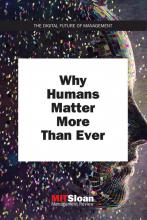
Book description (via MIT): “In these technocentric times, it is more important than ever to manage people well. Companies—employees and managers—may feel overwhelmed by the never-ending disruptions caused by new technologies. This volume in the Digital Future of Management series shows why we should step back, take stock, and seize just a bit more control over how our world is evolving. In Why Humans Matter More Than Ever, management experts from both industry and academia offer strategies for managing people in our brave new digital world.”
Why you should read it: The more technology we surround ourselves with, the more human we need to be. As sophisticated capabilities like AI take over more day-to-day tasks in the workplace, it becomes more important for the human workforce to do what it does best: collaborate, empathize, explore, and learn. While some of this collection of articles cover topics related to creating smart and effective principles for technology–human interactions, others offer tips on how leaders can help their teams (and themselves) become more collaborative, empathetic, curious, and adaptable in an increasingly digitized world.
4. Design for How People Think: Using Brain Science to Build Better Products
By: John Whalen
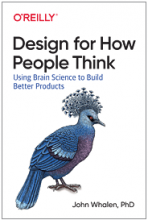
Book Description (via O’Reilly): “User experience doesn’t happen on a screen; it happens in the mind, and the experience is multidimensional and multisensory. This practical book will help you uncover critical insights about how your customers think so you can create products or services with an exceptional experience. Corporate leaders, marketers, product owners, and designers will learn how cognitive processes from different brain regions form what we perceive as a singular experience. Author John Whalen shows you how anyone on your team can conduct “contextual interviews” to unlock insights. You’ll then learn how to apply that knowledge to design brilliant experiences for your customers.”
Why you should read it: IT success or failure is inextricably linked to the user experience – and on the other end of that experience is a person. A cognitive scientist with more than 15 years of human-centered design experience, Whalen describes the “six minds” of user experience and how each contributes to the overall perception of the human being on the other side of IT’s handiwork. CIOs can learn how to apply the best of brain science and psychology to improve their products and services. Bonus: The book includes case studies from Fortune 100 companies who have used this people-centric approach to systems development.
5. Humble Leadership: The Power of Relationships, Openness, and Trust
By: Edgar H. Schein and Peter A. Schein
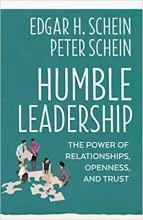
Book description (via Amazon): “The more traditional forms of leadership that are based on static hierarchies and professional distance between leaders and followers are growing increasingly outdated and ineffective. As organizations face more complex interdependent tasks, leadership must become more personal in order to insure open trusting communication that will make more collaborative problem solving and innovation possible. Without open and trusting communications throughout organizations, they will continue to face the productivity and quality problems that result from reward systems that emphasize individual competition and “climbing the corporate ladder”. Authors Edgar Schein and Peter Schein recognize this reality and call for a reimagined form of leadership that coincides with emerging trends of relationship building, complex group work, diverse workforces, and cultures in which everyone feels psychologically safe.”
Why you should read it: In a dynamic world, humility has emerged as a leadership super power. Former professor of MIT’s Sloan School of Management Edgar Schein teamed up with his son Peter, co-founder and COO of the Organizational Culture and Leadership Institute, for this work. They argue that that the top-down, larger-than-life, command-and-control approach of yore no longer yields good results. Those leaders that succeed embrace empathy, vulnerability, and transparency. Their humble leadership model is based on mastering a complex mosaic of personal relationships rather than the transaction relationships that exist based on status and hierarchy. In that way, they say, leaders can build the trust and openness necessary to improve information flow, resiliency, and adaptive decision-making.



